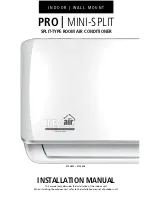
47
ENGLISH
PIPE CONNECTIONS BETWEEN INDOOR AND OUTDOOR UNIT
Vacuum
Vacuum drying should be made from the service port provided on the outdoor unit’s service valve to the
vacuum pump commonly used for liquid pipe, gas pipe and high/low pressure common pipe. (Make Vacuum
from liquid pipe, gas pipe and high/low pressure common pipe with the service valve closed.)
* Never perform air purging using refrigerant.
• Vacuum drying: Use a vacuum pump that can evacuate to -100.7 kPa (5 Torr, -755 mmHg).
- Evacuate the system from the liquid and gas pipes with a vacuum pump for over 2 hrs and bring
the system to -100.7 kPa. After maintaining system under that condition for over 1 hr, confirm
the vacuum gauge rises. The system may contain moisture or leak.
- Following should be executed if there is a possibility of moisture remaining inside the pipe.
(Rainwater may enter the pipe during work in the rainy season or over a long period of time)
After evacuating the system for 2 hrs, give pressure to the system to 0.05 MPa(vacuum break)
with nitrogen gas and then evacuate it again with the vacuum pump for 1 hr to -100.7 kPa(vac-
uum drying). If the system cannot be evacuated to -100.7 kPa within 2 hrs, repeat the steps of
vacuum break and its drying. Finally, check if the vacuum gauge does not rise or not, after main-
taining the system in vacuum for 1 hr.
Scale
Use a graviometer. (One that
can measure down to 0.1 kg).
If you are unable to prepare
such a high-precision gravimeter
you may use a charge cylinder.
Indoor unit
Slave 1 outdoor unit
Master outdoor unit
Liquide pipe
Gas pipe
Liquide pipe
Gas pipe
Liquid side
Gas side
Close
Close
Close
Close
Vacuum
pump
NOTE
!
Always add an appropriate amount of refrigerant. (For the refrigerant additional charge)
Too much or too little refrigerant will cause trouble.
To use the Vacuum Mode
(If the Vacuum mode is set, all valves of Indoor units and Outdoor units will be opened.)
WARNING
Use a vacuum pump or Inert(nitrogen) gas when doing leakage test or air purge. Do not compress
air or Oxygen and do not use Flammable gases. Otherwise, it may cause fire or explosion.
- There is the risk of death, injury, fire or explosion.
!
WARNING
When installing and moving the air conditioner to another site, recharge after perfect evacuation.
- If a different refrigerant or air is mixed with the original refrigerant, the refrigerant cycle may
malfunction and the unit may be damaged.
!
















































